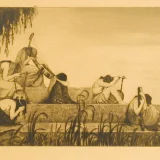Of Sparrows and Lost Teens
January 1993
“Are not two sparrows sold for a penny? Yet not one of them will fall to the ground apart from the will of your Father. And even the very hairs on your head are all numbered. So don’t be afraid; you are worth more than many sparrows.” Matthew 10:29-31.
I may not know a lot of sparrows who have fallen but I do know a lot of the teens I have worked with who have fallen. I can picture them as sparrows hitting a glass window (splat!), falling injured, and not knowing how to get up. The idea of God’s grace is inconceivable. The politics of church life are as secular as in the real world. The picture of God does not seem to square up with the real world.
All of these “sparrows” of mine who are falling, God knows about. God even knows about the situations that have caused them to hit that window.
And these “sparrows” are not sold at two for a penny for they were bought at a much higher price—the sacrifice of His Son, Jesus. God cares deeply about these “fallen sparrows” (immeasurably more than I do) and is looking out for them as He is looking out for me. He knows their hurt and their confusion. He may even be carrying them as He has carried me so many times. I’m referring to the reference in the poem “Footprints:” The man asks the Lord, ‘Lord, you said once I decided to follow you, you would walk with me all the way, but I have noticed that during the most troublesome times in my life there is only one set of footprints. I don’t understand why in times I need You most You would leave.’ The Lord replied, ‘My precious child, I would never leave you during your times of trial and suffering. When you see only one set of footprints, it was then that I carried you.’”
Whew! This takes a lot of pressure off of me. Nowhere in the Bible does it say that I am responsible for someone’s salvation. Paul wrote in 1 Corinthians 3:6-7, “I planted the seed, Apollos watered it, but God made it grow. So neither he who plants nor he who waters is anything, but only God, who makes things grow.” My responsibility is to plant and water—and to do that responsibly. Once I do my part God is to make the seed grow. If it doesn’t and my loved one gets lost or hits that window, it is God’s responsibility.
With the price God paid for that person, I am assured God will take care of him or her.
This helps some with pain I feel when a teenager turns away from God. My paid is real as I would do anything to protect one from separation from their Father in Heaven and the results of that separation.
Because of the pain we suffer and the true love we have for our teenagers, we may do anything to keep them in the fold—even beating them with easy answers and clichés to keep them there. Instead of letting them search on their own for these answers, we do the answering for them truly wanting to spare them from the pain of that search.
Stephen D. Jones, author of Faith Shaping: Youth and the Experience of Faith, has identified seven stages of faith shaping: Experiencing, Categorizing, Choosing, Claiming, Deepening, Separating, and Responding. Separating is a legitimate stage in a youth’s development of his/her own faith. This is a time where he/she lets one’s faith settle. After this time of separating, the youth, or maybe young adult now, returns to a true commitment. The commitment is much stronger than any commitment made at a younger because it is done after having searched out their questions. And this new commitment is often very memorable. This is true, isn’t it? How many testimonies have you heard (or possibly your own) of someone who was active in youth group at a younger age, then went wild, and now is serving the Lord in some dynamic way.
When does this stage of Separating usually happen? In the late adolescent years, which is pain to us. Our once lovable, loyal, hot and cold (at least they were present) teenagers are now missing and hurting.
Remember, these youth are worth more than sparrows because a great price was paid for them. Remember, our job is to plant and water. It is God’s to cause it to grow.
Our responsibility is to plant and water. This can have a major part in saving a youth from the degradation of sin or from those wild years. What you do at this now recognized stage of faith can make the difference in it being a short time with little destruction or years with a lot of destruction.
I recently read a novel entitled Wisdom Hunter. It’s about a pastor who went through a separation period and found God. What I found interesting was that he went through years of searching. Finally he met an older minister. His minister did not beat him back into the fold or offer easy answers and clichés. He let more time pass as he planted, watered and exhibited grace. This minister let time pass and it was okay.
Sometimes we fear the rapture or an early death will come and leave these youth behind so we rush them into a true commitment. Or we want to spare them of the pain from their choices they are making. The time separated is okay. God knows their whereabouts. They are worth more than sparrows and He may even be carrying them. Our responsibility is to continue to plant and water.



